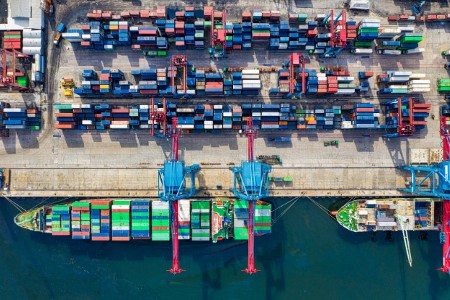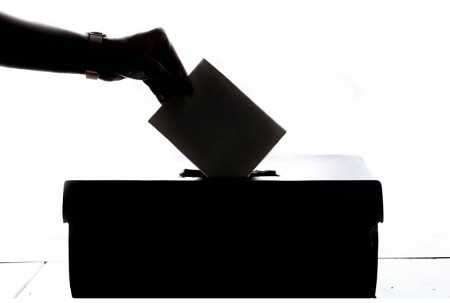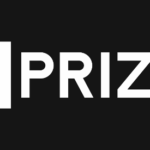May 15, 2020 – Uma Campbell is a repeat guest blogger here at 21st Century Tech Blog. She is a freelance writer and yoga instructor from Southern California. You can reach her on Twitter at @umajcampbell. Her topic of today focuses on how blockchain technology is or will play a new role in a post-COVID-19 world from helping to reconnect the world’s supply chains, to contact tracing, and to secure digital voting systems.
The COVID-19 pandemic has affected nearly every aspect of ordinary life. Entire industries have been disrupted, and millions of people around the world are adjusting to a new daily routine. No corner of modern life has been unaffected by COVID-19 with the blockchain industry both negatively and positively affected. How so the latter? The blockchain is being seen as a way for many economic sectors to recover from COVID-19’s detrimental impacts. Similar to how shipping APIs help the transportation sector, the blockchain is being used to help supply chains bounce back.
Blockchain, COVID-19, and the Supply Chain
Global shipping has been massively disrupted by the coronavirus and by each country’s response to the pandemic. Supply chains are no longer running smoothly as different precautions put in place try to slow the spread of the virus. Shipping products from overseas requires jumping through new hoops to meet health and safety guidelines from different countries. Customers aren’t sure how much stock retailers have, and retailers aren’t sure when they will receive new inventory. Even critical supplies like personal protection equipment (PPE) are being held up because of shipping complications. The standard paper trail businesses use to track shipments has become disjointed. But the blockchain is being used to rectify supply lines.
Using the blockchain provides trust and verification through a digital paper trail that is dependable and secure. When information is stored using the blockchain, the previous data within the chain can no longer be altered. Blockchain essentially locks the data, so the next person adding to the chain can do so with confidence knowing that the entire transaction is secure. This technological security gives users the ability to maintain visibility throughout the entire supply process. Users securely monitor quality control, worker standards, and performance tests. When everyone involved in the supply chain knows what is going on, the likelihood of mistakes happening decreases. For example, the permanent audit trail the blockchain gives buyers of medical equipment the power to check the provenance of all parts in the transaction. This works equally well whether the transaction is for masks, ventilators, or the ingredients for pharmaceuticals. Adding blockchain technology, therefore, produces safer and more dependable shipments that can be easily tracked through the entire supply process.
Contact Tracing with Blockchain
The blockchain can also be used for contact tracing. As governments try to track exposure to the virus they walk a fine line between data collection and privacy protection. By using blockchain processes, contact tracing can happen securely and privately. That’s because the blockchain does not have a central authority, and users ultimately control their own data. That means users participate in contact tracing data collection without compromising their privacy. Voluntary data collection only works if users feel safe enough to provide information and by giving privacy control to users, data collectors increase the odds of more people participating. Contact tracing only works with maximum participation to make the data set large enough to detect infection spread patterns.
Various companies across the world are working on contact tracing programs using the blockchain. Privacy experts in Europe propose using a decentralized privacy-oriented proximity tracing system that uses both Bluetooth and the blockchain. This proposed protocol was designed by a handful of research institutes in Europe with the express goal of ensuring user privacy and preventing the collected data from being misused. Another German tech company has created a blockchain contact tracing app that promises users absolute privacy. The decentralized biobank Genobank is building a blockchain contact tracing platform that lets users acquire anonymous COVID-19 tests and send the information to connected organizations.
Using the Blockchain for Digital Voting
Some consider the disrupted Wisconsin Democratic primary a missed opportunity to test a blockchain-based digital voting system. In the face of a pandemic, this type of voting would have been much preferred to having citizens standing in lines exposing themselves to COVID-19 which unfortunately led to new cases.
Digital voting is sometimes referred to as e-voting or i-voting. The “e” stands for electronic, and the “i” for the Internet. The biggest concern for either electronic device voting or casting a ballot through a web browser is the security of the transaction. Countries like Estonia have had e-voting since 2005, and i-voting since 2007. The system doesn’t use the blockchain but rather encrypted national ID cards. Cards can be stolen or lost. Other European countries have trialed electronic voting and subsequently abandoned the practice. But in the face of a global pandemic, security experts believe using the blockchain to create a digital voting system would solve the card issue in Estonia, and provide absolute privacy for every citizen casting a ballot. Using the blockchain eliminates dependency on the foibles of electronic voting machines. The transaction of each ballot cast is fully secure. A blockchain-based vote would require three distinct pieces of user authentication: a unique ID number, a one-time use password upon registering to vote, and an electronic ballot containing a URL specific to the locality of the voter and a QR code.


















[…] environmental sustainability concerns, they are looking at every aspect of operations including supply chains. Becoming more energy efficient is, therefore, top of mind. Luckily, there are many different ways […]